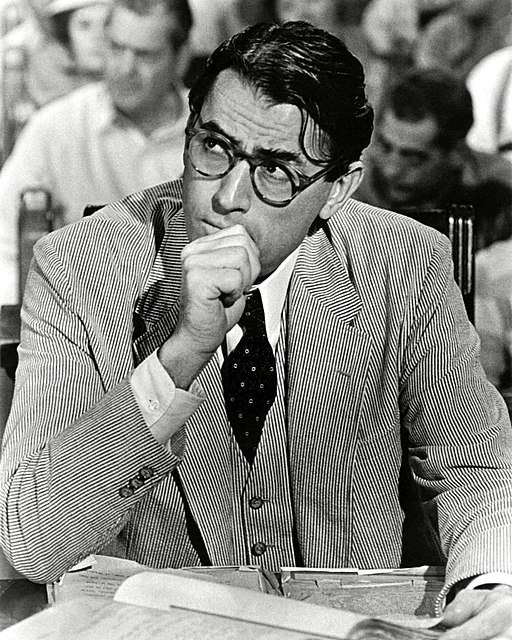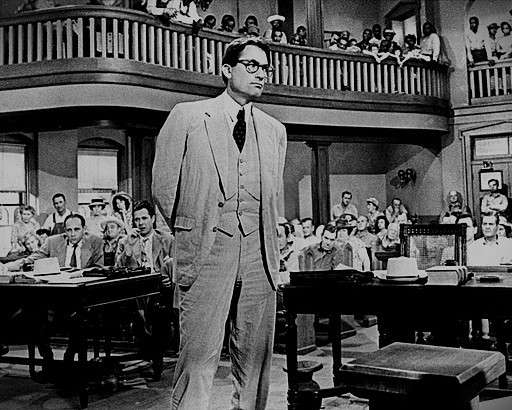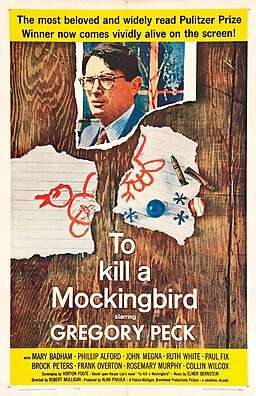Released in 1962
Genre– Drama, Legal, Crime, Life
10/10
Main Cast: Gregory Peck
Music– Elmer Bernstein
Screenplay: Horton Foote
(Based upon “To Kill a Mockingbird” by Harper Lee)
Direction– Robert Mulligan
BRIEF INTRODUCTION
Step into the world of ‘To Kill a Mockingbird,’ a film adapted from Harper Lee’s renowned novel. Set in a small Southern town during the 1930s, the story revolves around Atticus Finch, a principled lawyer, who defends a black man falsely accused of assaulting a white woman. Through the eyes of Finch’s young daughter Scout, the film explores themes of racial injustice, moral courage, and societal prejudices prevalent in the era.

‘To Kill a Mockingbird’ (1962)
Universal Pictures, Public domain, via
Wikimedia Commons
The Movie
This 1962 adaptation of the universally acclaimed Pulitzer Prize winner impeccably translates Harper Lee’s powerful narrative onto the screen. The screenplay beautifully captures the essence of the novel, offering an authentic portrayal of small-town racial tensions in the 1930s.
Through captivating Black & White cinematography, the film crafts a visually stunning world that envelops viewers in its poignant storytelling.
Gregory Peck’s portrayal of Atticus Finch remains iconic, his performance is a testament to the character’s moral integrity and compassionate nature.
Robert Mulligan’s visionary direction ensures a tightly woven, ahead-of-its-time courtroom drama that grips the audience from start to finish.
‘To Kill a Mockingbird’ is not just a film, it’s a masterclass in storytelling, tackling themes of injustice and humanity that resonates powerfully even today.

‘To Kill a Mockingbird’ (1962)
Universal Pictures, Public domain, via Wikimedia Commons
Thoughts
The film delves into its subject matter with a bold sensitivity that goes beyond mere appreciation for the screenplay. Such films are made once in a while, but they stay forever because of the innate feeling of love and warmth they offer to the audience. The innocence of Scout and Jem, Atticus’ moral integrity and ethical character, the injustice done to Tom Robinson, and Boo Radley’s (played by Robert Duvall) surprising role in the end – all these elements leave a lasting impression on the audience that will stand the test of time as a testament to moral integrity and love.
Performances
Beginning with Peck’s portrayal of Atticus, the cast’s talent shines brightly in the film. Mary Badham as Scout and Phillip Alford as Jem delivered unforgettable portrayals, leaving an indelible mark on the silver screen. From the very start, their presence invigorated every frame, showcasing seamless performances without a hint of struggle. Whether in emotional or challenging scenes, they captivated the audience effortlessly. Notably, the iconic moment when Scout and Jem rush to Atticus while he guards Tom Robinson is a powerful demonstration of their performances.

(1963 US theatrical poster)
Universal Pictures, Public domain, via Wikimedia Commons
Awards and Nominations
TO KILL A MOCKINGBIRD 1962 won three Academy Awards (1963) and two Golden Globes (1963). The Oscars included Best Screenplay (Based on Material from Another Medium), Best Art Direction, and Best Actor for Peck. Golden Globes included Best Original Score (Motion Picture) for Elmer Bernstein and Best Actor in a Motion Picture (Drama) for Peck. In addition to the Oscars and Golden Globes, the film was recognized with many other prestigious awards and nominations.
P.S. A lesser-known fact, the character of Scout Finch was inspired by Harper Lee herself, reflecting her childhood experiences in Monroeville, Alabama. Lee’s real name was Nelle Harper Lee, and she drew from her own life to create the beloved character of Scout.
#ToKillAMockingbird #HarperLee #RobertMulligan #HortonFoote #GregoryPeck #MaryBadham #PhillipAlford #RobertDuvall #BrockPeters
In case you overlooked our earlier post, here’s the link
Martin Scorsese’s ‘Bringing Out the Dead’ (1999)

Leave a Reply